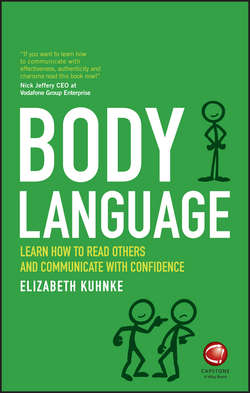Читать книгу Body Language - Kuhnke Elizabeth - Страница 5
На сайте Литреса книга снята с продажи.
1
What Your Body Language Says About You
Оглавление“There’s language in her eye, her cheek, her lip, Nay, her foot speaks; her wanton spirits look out At every joint and motive of her body.”
William Shakespeare
Feeling hot, engaged, and passionate? Feeling low, aloof, and cool? You don’t need to answer that question. Your body says it all.
Standing proud and strutting your stuff indicates that you’re ready and raring to go, while slumping your shoulders and shuffling your feet shows that you’re carrying a heavy load. Hanging out on the sidelines with your arms crossed, a frown on your face, and your head burrowed into your chest suggests you’re suspiciously watchful; meanwhile, engaging with a group of people, using open gestures and animated expressions, implies that you’re prepared to party.
The Inner and Outer Connection
What you might find interesting about non-verbal behaviour – and body language in particular – is the relationship between values, beliefs, attitudes – and gestures, facial expressions, posture.
For example:
If openness is important to someone, you can expect to see that value reflected in free, approachable, and receptive movements and facial expressions. If they value privacy, their body language is more closed and contained.
If you hold the belief that you’re unworthy, insignificant, and somehow “lacking”, you might (1) overcompensate by being loud, brash, and seeking attention; or (2) withdraw, physically cave in on yourself, and avoid engaging with others. On the contrary, if you believe that you’re an okay person, you will likely greet other people with warmth, curiosity, and generosity.
If your attitude is “I can’t be bothered”, your facial expressions are slack and your movements lack spontaneity. When you embrace a “Go, get ‘em!” attitude, your body bursts with liveliness. Smiles surge across your face and you fist-pump the air as you jump for joy. Or a modified version of that.
In addition, consider the connection between feelings and behaviour. Whether you’re conscious of them or not, your emotions, moods and state of mind play out in the way your body moves.
For instance, feeling upbeat and wanting to spread the love? Note your gestures and facial expressions: smiling, open, with a spring in your step and a sparkle in your eye. Feeling downbeat and demoralized? Look at yourself now: limp, bowed, with little sign of life.
“ Even if you’re trying to hide what you’re experiencing, little leakages, “tells”, and mini micro expressions give the game away every time. ”
Little Things Mean A Lot
A client asked me to join her while she interviewed a potential member of her leadership team. Both when she asked the candidate about his contribution to the success of the previous team he led and what value he could bring to the organization, I observed micro expressions flash across his face and body movements that indicated a high level of defensiveness. These consisted of:
• pursed lips
• flared nostrils
• tossing head and casting sky shots
• forced laughter
• fake smile
• shifting in his seat
• jiggling feet
• pulling backwards into his seat while crossing his arms and legs and tilting his head sideways.
Although the facial expressions were fleeting, they were telling, as were his body movements and gestures. Together, they conveyed the message that he was feeling the pressure. And, no surprise… Turns out that the candidate wasn’t all he claimed to be.
Had my client not trusted my observations, she could have made an expensive mistake. While he told a good tale – spinning and exaggerating here and there – his body’s movements told a truer story.
Not even your thoughts and intentions are immune to reflecting themselves in your movements and facial expressions. For example, your boss says something that you think is the stupidest thing you’ve ever heard. Before you know it, your eyes are rolling around in your head, which is the rudest facial expression a person can display, next to gagging. At that point, you might consider looking for a new job, as you may have blotted your copy book by demonstrating your derision and disdain.
Another example. You see someone who catches your attention. And you catch theirs. Observe how your bodies speak. Your eyes connect and hold the gaze. Your lips slide into shy, sensuous, inviting smiles. Your chests and chins may lift as your bodies tilt forward, all of which indicate that your intention is to get to know one another.
“It’s amazing how many things you can do when you’re just pretending.”
– Kim Gordon
Applying the “As If” Principle
Frequently, clients ask me to help them develop and project confidence. From the C-suite to the up and coming stars, confidence is the number one quality they all want to possess. No matter how successful they are at their day jobs, each one has a little voice inside their heads telling them that they’re not very good at demonstrating, for instance:
• poise
• assertiveness
• self-assurance.
Frequently they ask me how they can convey:
• calmness in a crisis
• conviction
• courage.
I tell them, “Act as if.”
According to the “as if” principle, you can create whatever state you desire by acting “as if” you already have what you would like to have. Like a child at play, you pretend to be who – or what – you want to be. And bingo! Before you know it, you’ve convinced yourself and others that you are, in this instance, confident.
Конец ознакомительного фрагмента. Купить книгу
